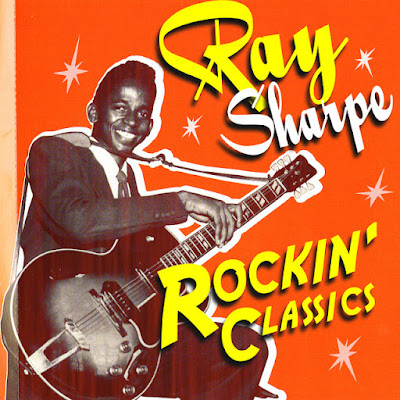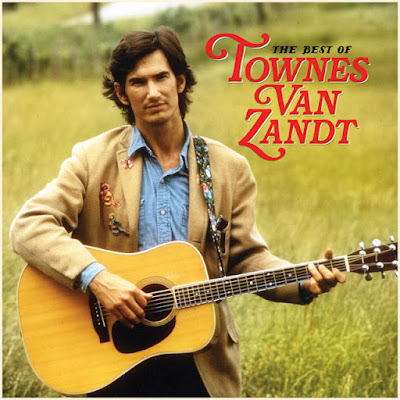Let’s start with a little bit of history to start this blog
off. Probably the most famous contemporary Music Stars from the Fort Worth area
are Kelly Clarkson, who grew up just south of downtown in Burleson, TX, and
Kirk Franklin, but there are several other talented folks who paved the way
before Kelly and Kirk. Here are just a few. This is in no way intended to be a thorough
biography. You should research these musicians to learn their full stories.
Ray Sharpe
First, we have Ray Sharpe. Born Edward Ray Sharpe on
February 8, 1938, in Fort Worth, TX. Best known for his 1959 dual market hit
"Linda Lu," the singer-songwriter parlayed interest in his early
recordings into a solid following in domestic clubs and international
festivals. Sharpe's style encompasses all the best elements of early rock 'n'
roll. As a singer-songwriter, he has mined Chuck Berry-type humor from the
situations and wordplay in his songs. As a guitarist, he alternates snarling
single note Albert King guitar bends with with twangy, free-flowing rockabilly.
"When I wrote 'Linda Lu' back in the 1950s, I didn't
think much of it," Sharpe told Randy McNutt, author of We Wanna Boogie:
The Illustrated History of the Rockabilly Movement. "A buddy of mine named
Mike had asked me to write a song about his girlfriend, Linda, who used to come
into the club to dance." He further recalled, "I wrote the song to
rib her a little bit. You see she had a fascinating rear end, so to speak. When
she danced, people watched." After playing the song in clubs, the singer
forgot about it until his second recording session at Hamilton. "Then in
the winter of 1958 I went to the Audio Sounds recording studio to make a record
with Duane Eddy's band backing me up," Sharpe recalled. "My producer
Lee Hazelwood asked me if I had one more song to make four, and I was stuck. So
I started playing 'Linda Lu" for him."
"Linda Lu" became something of a bar-band anthem
in the United States, where it was covered by various acts, most notably
blue-eyed soul rocker Wayne Cochran. In the United Kingdom, Johnny Kidd &
the Pirates hit the British Top 50 with their version.
Although "Linda Lu" continues to be his most popular composition, Sharpe's songs have been covered by artists as diverse as Neil Young, J.B. Hutto, and Rickie Van Shelton. A stroke of good fortune came his way during the early 1990s when, like his contemporary and close friend the late Ronnie Dawson, he was rediscovered by rockabilly enthusiasts. Nowadays he mixes bookings at domestic blues festivals with overseas rockabilly revivals, where he is overwhelmingly received as the star he deserves to be.
Bobby Day
Rock and Roll and R&B singer and songwriter Bobby Day was best known for his only major hit “Rockin’ Robin” recorded in 1957 on the Classic Label. In 1958, the single, written by Leon Rene under the pseudonym Jimmie Thomas, reached no. 1 on the R&B chart, no. 2 on the Billboard Hot 100 chart, and sold over one million copies. Day was a multi-instrumental artist, music producer, singer and songwriter.
Robert James Byrd was born July 1, 1930, in Fort Worth,
Texas. He moved to Los Angeles at age 15 and began performing with the
Hollywood Flames at the Otis’s Barrelhouse Club in Watts, Los Angeles.
Best known for his songwriting ability, Day wrote and
recorded “Little Bitty Pretty One” but it was made popular by Thurston Harris
whose version hit no. 6 on the Billboard Hot 100 chart in 1958. The single was
also recorded by Frankie Lymon in 1960 followed by Clyde McPhatter in 1962. The
Jackson Five recorded the song in 1972 where it reached no.13 on the Billboard
Hot 100 chart and no. 2 on the Billboard R&B chart. Day wrote and recorded
“Over and Over” that climbed to no.40 on the pop chart in 1958. The Dave Clark
Five, an English Rock & Roll band in 1958 made their own version which hit
the Billboard Hot 100 in 1965. Among
other songs he wrote and recorded were “The Bluebird, The Buzzard and the
Oriole,” and “That’s All I Want” in 1959. Day recorded on several record labels
including Rendezvous, RCA, Sure-Shot, and Jama Records.
Day appeared on several variety shows in the 1950s, 1960s and 1970s including American Bandstand and The Midnight Special. Both were live music variety shows featuring performances by popular artists, interviews of celebrity guests, and teenagers dancing.
Bobby Day died of prostate cancer at age 60 on July 27,
1990, in Los Angeles. He is survived by his wife Jackie and their four
children.
Ornette Coleman
Ornette Coleman was one of the true jazz innovators, whose
sound was instantly recognizable and unquestionably unique. Coleman's work
ranged from dissonance and atonality to liberal use of electronic accompaniment
in his ensembles, as well as the engagement of various ethnic influences and
elements from around the globe. While experimenting with time and tone, his
strong blues roots were always evident.
For the most part, Coleman was self-taught, beginning on the
alto saxophone at age 14. Coleman's earliest performing experiences were mostly
with local rhythm-and-blues bands. Coleman settled in Los Angeles in 1952. His
search for a different sound and approach, a means of escaping traditional
chord patterns and progressions, led some critics to suggest that he did not
know how to play his instrument. In reality, he was studying harmony and theory
zealously from books while supporting himself as an elevator operator.
The year 1959 was an important one for Coleman and his band: he signed a recording contract with Atlantic Records, recording the first album to really present his new sound, Tomorrow Is The Question!; his quartet was invited to participate in what became a historic session at the Lenox School of Jazz in Massachusetts, being championed by John Lewis and Gunther Schuller; and the band began an extended engagement at the Five Spot Cafe in New York. Meanwhile, Coleman was developing an approach to his music that he was to dub "harmolodics."
Roger Miller
Roger Miller was more than just a honky-tonk man and singer.
He was also a songwriter, a guitarist and fiddler, a drummer, a T.V. star, a
Broadway composer, and perhaps, above all else, one of the wittiest
personalities in Country music.
Though he's known largely as a writer of novelty songs, due
to such hits as "Dang Me," "Chug-A-Lug," and "England
Swings," Roger Miller was in fact one of the finest country songwriters of
the '60s and '70s, and an important influence on the progressive country
movement. Blending country with jazz, blues, and pop, he utilized unusual
harmonic and rhythmic devices in his sophisticated songcraft, creating
timeless, widely covered gems ("King of the Road," "Husbands and
Wives") that have been tackled by everyone from Dean Martin to Giant Sand.
In the '80s, he wrote the songs for the Broadway musical Big River, which ran
for over 1,000 performances and won seven Tony Awards.
Miller was born in Fort Worth, TX, but raised in the small
town of Erick, OK, by his aunt and uncle, following the death of his father and
his mother's debilitating sickness. Initially, he was attracted to music by
hearing country over the radio as well as by his brother-in-law, Sheb Wooley.
By the time he was ten, he earned enough money picking cotton to buy himself a
guitar. At the age of 11, Wooley gave him a fiddle and encouraged him to pursue
a performing career. Miller completed the eighth grade and left school to
become a ranch hand and rodeo rider. Throughout his adolescence, he played
music in addition to working the ranch. Soon, he was able to play not only
guitar and fiddle, but also piano, banjo, and drums.
Townes Van Zandt
With an understated voice that quietly overflowed with melancholy, humor, and insight, Townes Van Zandt was an icon of American songwriting. His songs would become hits for other artists, but substance abuse issues, problems with record labels, and general hard luck saw him spending the majority of his life as a cult figure at best, drifting across the world playing tiny rooms up until his early death at 52.
Van Zandt was respected and admired by his contemporaries during his life, particularly for a hot streak of records he recorded in the early '70s that included High, Low and in Between and The Late Great Townes Van Zandt.
T-Bone Burnett
In a musical career that dates back to the mid-'60s, T-Bone Burnett has earned the respect of his peers and a loyal cult following as an uncommonly thoughtful and frequently witty singer and songwriter with a singular take on the moral dilemmas of modern life. The updated rockabilly of 1980's Truth Decay and the expansive rock sounds of 1983's Proof Through the Night won him plenty of accolades as a songwriter, but he's enjoyed significantly greater success as a producer, helming projects for a diverse array of artists, from Roy Orbison, Elvis Costello, and Gillian Welch to Los Lobos, Rhiannon Giddens, and Imelda May, giving them a sound that's warm and dynamic, and imaginative arrangements that are engaging while serving the song and the vision of each artist.
He's won a number of Grammys and has a
successful second career coordinating music for film and television, with his
credits including 2000's O Brother Where Art Thou, 2012's The Hunger Games, and
2012's debut season of the TV series Nashville (created and produced by his
wife, Callie Khouri). As his work in TV, in film, and as a producer took up
more of his time, Burnett's own albums became a sideline, but he could still
produce strong, deeply moving album, typified by 2019's The Invisible Light:
Acoustic Space and 2022's The Invisible Light: Spells, two entries in a cycle
of albums he insists will be his last.
Born Joseph Henry Burnett on January 14, 1948 in St. Louis,
Missouri, he grew up in Fort Worth, Texas, soaking in the area's indigenous
blend of blues, R&B, and Tex-Mex sounds.
Delbert McClinton
The venerable Delbert McClinton is a legend among Texas roots music aficionados, not only for his amazing longevity, but for his ability to combine country, blues, soul, and rock & roll as if there were no distinctions between any of them -- in the best time-honored Texas tradition. A formidable harmonica player long before he recorded as a singer (he played the signature harp riff on Bruce Channel's 1962 number one hit "Hey! Baby"), McClinton's career began in the late '50s, yet it took him nearly two decades to evolve into a bona fide solo artist with 1975's Victim of Life's Circumstances.
After working hard for a few years, McClinton scored a Top Ten hit when the slick, funky "Giving It Up for Your Love" peaked at number eight in 1981. While it was his only pop hit, it laid the groundwork for an enduring career as an American roots artist. McClinton's profile received a boost in 1992, when he won a Grammy Award for "Good Man, Good Woman," his duet with Bonnie Raitt. More duets and awards followed as he settled into a blues direction with several albums for New West (two of which were Grammy winners). McClinton continued to use blues as a foundation for him to explore other roots music in the 21st century, releasing new material and touring steadily.
Delbert McClinton was born in Lubbock, Texas, on November 4,
1940, and grew up in Fort Worth. Discovering the blues in his teenage years,
McClinton quickly became an accomplished harmonica player and found plenty of
work on the local club scene, where musicians often made their living by
playing completely different styles of music on different nights of the week.









.jpg)



No comments:
Post a Comment